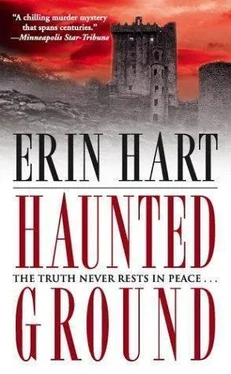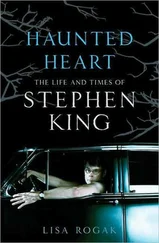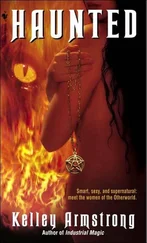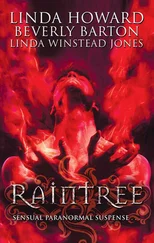Just past seven o’clock, Cormac was splashing at the tiny sink in his room above Lynch’s pub in Dunbeg. Devaney had helped him sort out lodging. The accommodation was basic: a single bed and no shower, but at a tenner a night, it would certainly do.
Cormac’s chin was now covered in white lather; as he removed it with short, deft strokes of the razor, he pictured the red-haired girl’s distorted countenance, and tried pressing his own teeth into the pliable flesh of his lower lip. His nostrils recalled the pleasantly rusty tang of the bog air, occasionally layered with the clean, soapy scent of Nora Gavin working closely beside him. They’d arranged to meet at Collins Barracks in Dublin tomorrow afternoon, and Cormac felt himself looking forward to the prospect. But for that one slight flinch down in the cutaway, Nora had remained perfectly composed throughout the excavation—he reminded himself that this was a woman used to working on cadavers, after all—but unless he was mistaken, she’d suddenly gone rigid when Devaney started telling them about the disappearance of Mina Osborne. Of all the things they had seen and heard today, why should that be so upsetting to Nora? Osborne’s anguish had seemed perfectly convincing, but he didn’t envy Devaney the task of sorting truth-tellers from dissemblers. How could you not become jaded, dealing with utterly convincing liars every day?
Cormac rubbed the last bits of lather from his ears and was absently checking his clean-shaven face in the mirror when he heard the sound of a creaking footfall in the hallway outside his door, then silence. A vague disquiet passed through him, then was gone. He swung the door open to find Una McGann with her hand raised, ready to knock.
“Oh, Jaysus Christ, you gave me a fright,” she said.
“Sorry, I thought you were Devaney again,” Cormac replied, crossing to the chair where he’d hung his fresh shirt, feeling suddenly naked and self-conscious in close quarters.
Una remained at the doorway, apparently not wanting to intrude into the small space, but also slightly wary of him, Cormac thought. She crossed her arms and looked at her feet. “I can imagine what he’s been telling you. But I really came to ask if you’d want to join us for supper. There’s nothing open here in the village this time of day, and I thought you could use a decent meal after all your work.”
“You’re very kind; that sounds great,” Cormac said, sitting on the edge of the bed to put on his shoes. “I won’t be a minute. Devaney mentioned there’s a good traditional session here on a Tuesday night.”
“It’s brilliant. My brother Fintan always goes along for it. Do you play, yourself?”
“Flute.” He indicated the instrument case that lay beside him on the bed. “What’s Fintan at?”
“The pipes. Ah, sure, Fintan’s pure stone mad for the music—always was.”
“I was hoping for another chance to speak to Brendan, too,” Cormac said, pulling his last shoelace tight. McGann had disappeared from the bog so quickly this afternoon that he hadn’t had a proper chance to bring up the subject of financial compensation. Artifacts found on Bord na Mona lands paid a fairly decent finder’s fee—mainly to keep the turf board workers honest—but there was no regular system of payment for objects that turned up on private property. Most people didn’t expect anything for discovery of human remains. But part of his job here was to find out whether that would be a problem—without actually asking the question, of course.
“He can be a bit rough, I know, but Brendan is really the decentest man you could meet,” Una said. “He’s just out of sorts because it’s another setback. It’s already the end of April, and he figures we should have finished footing the turf a fortnight ago.”
As they drove out of the village, Cormac began to feel he was getting his bearings about the place. Dunbeg was in the center of a small peninsula that jutted out into Lough Derg. He knew that around the curve of the small inlet north of the town was Bracklyn House, and beyond that another quarter mile down the shore lay the brown expanse of Drumcleggan Bog. The day’s fair weather had lasted into evening, and now there was a high, milky cast to the sunlight that played on the waves of Lough Derg, visible now and again through the overgrown hedgerows as they made their way up the high road out of the village.
Una was quiet for a moment, then asked: “You got the cailin rua safely off to Dublin, then?” The cailin rua, Cormac thought. It was a fitting name for her: the red girl. “Nobody said what’s going to happen to her.”
“Well, Dr. Gavin and the museum staff will see if they can estimate her age, and try to figure out how she died, I suppose. There’d be more to go on, obviously, if the body were also intact, but they can still gather quite a lot of information.” Una was silent, and he could feel her discomfort in the face of his enthusiasm.
“That’s not what you wanted to know, is it?”
“Actually, what I meant was what will happen to her in the end, after all that.”
“Well, at the moment the National Museum is keeping all its bog specimens in a special fridge,” Cormac answered, feeling as he said the words how callous it sounded.
“But what’s it in aid of? Maybe the poor girl deserves some peace.”
“If we can preserve bog remains, then we have a chance to answer questions in the future that we haven’t even conceived of yet. The examinations are carried out with the greatest respect.” Una didn’t seem satisfied by his answers, but said no more.
As they rounded a bend in the road, a forbidding tower house hove into view among the trees. The imposing stonework looked mostly intact, but its roof gaped open toward the sky and tufts of grass and wild phlox grew out of the chimney stones. Narrow windows were slashed into the sides of its gray stone bulk, which was half enshrouded in ivy. Though he’d been down this road earlier, Cormac had not seen it before.
“That’s O’Flaherty’s Tower,” Una said. “They were the big family around here once. It belongs to Bracklyn House now—to Hugh Osborne.”
As Cormac slowed the jeep to study the tower more closely, a large crow appeared out of one of the upper windows, spread its wings, and began to wheel around the ruin. A second bird joined it, then another, and another, in rapid succession until the topmost part was enveloped in a whirling mass of dark wings and a cacophony of croaking calls. The sight touched that place inside him, unrevealed to anyone, where he tucked away such otherworldly images and impressions, things connected somehow to myth and memory, to times and places that modern humankind could not completely understand.
Then, as unexpectedly as they had appeared, the noisy crowd of birds vanished, leaving a single dark shape dipping and soaring around the castle walls, the evening light glinting off its jet-black wings. A voice broke through beside him: “Are you all right?” Una asked. Cormac looked down and saw his hands on the steering wheel, feeling as if he’d just awakened from a dream. The jeep wasn’t moving. He’d come to a full stop in the middle of the road.
“People say the place is haunted,” Una continued, “and looking at you just now, I’m half tempted to believe it.”
“Sorry,” he said, pressing on the accelerator once more. Around a curve in the road, the dense forest around the tower gradually gave way to light undergrowth, and finally to the stone-walled grounds of the Osborne estate. “This is where Hugh Osborne lives?”
Una nodded. Through the imposing stone and wrought-iron gates Cormac could see a lawn and formal gardens, and Bracklyn House itself, a sturdy manor house of dark gray stone, its steep slate roof rimmed around with stepped gables and crenellations. It was modest, as Irish country houses went, and retained the rough-hewn look of the century in which it was built.
Читать дальше











